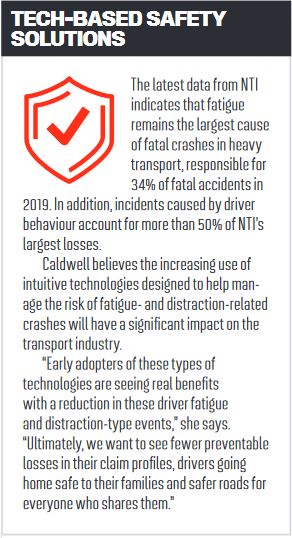

While insurance has traditionally been a boys’ club in the past, it’s been changing for the better for many years now, and that’s thanks to women like Brooke Caldwell of NTI making inroads in traditionally macho spaces like transport, logistics and heavy vehicle insurance.
“When I first started in the industry back in 1996, or even just thinking about 10 years ago at my previous employer, I looked around at who was in what types of roles, and it was clear that insurance was male-dominated,” Caldwell says. “Typically, women who were in managerial type roles were in HR. It wasn’t my experience to see women in executive, management or product management roles, particularly in spaces like transport or fleet.
“It’s a role and an industry that you will always learn something from” Brooke Caldwell, NTI
“I wouldn’t say that my experience at NTI has reflected that, but I would say that the insurance industry can be slow to change,” Caldwell says. “Not all insurance companies are created equal in this respect, but we are seeing pockets of change across some insurers and brokers. The more women step up and express what they want for their careers, the better their chances of driving their future in this industry and effecting real change for equality.”

Today, Caldwell is NTI’s national heavy motor product manager for fleet. It’s a dynamic role, encompassing one of the largest heavy motor books in Australia, that also allows her to keep a finger on the pulse of customers’ day-to-day wants and needs.
“It’s a role and an industry that you will always learn something from,” she says. “One of my mentors once said to me that the day you stop learning in an industry like ours is the day you should pack your bags and resign. Well, I’m 20-plus years in, and I am constantly learning new things, and it’s great to step up to each challenge!”
The last several months have thrown up plenty of challenges for Caldwell, from unprecedented bushfires from late 2019 through to January, flooding in the following months and now COVID-19.
“All of these situations required a lot of flexible and practical thinking about our customers and how both myself and NTI want to be there for our customers and, more broadly, for the transport industry,” Caldwell says. “When COVID-19 hit, NTI was one of the first insurers with all staff at home and fully operational to ensure our customers were supported and that our brokers could contact us.”
The central aim, she explains, is always to put money back in customers’ pockets without being complicated or asking lots of questions before providing a laid-up cover. Accordingly, NTI transacts business with both specialist transport brokers and non-specialist brokers to provide a broader range of services.
“We also provide our brokers the opportunity to access our NTI Traction program for their customers,” Caldwell says. “The program gives the customer a benchmark of their business compared to others in the transport industry, aiding them in uncovering the effectiveness of their current processes and potential barriers to change.”
The program is geared at giving all levels of the business a voice and providing clear, actionable outcomes for everyone to work toward, which helps clients improve their safety culture and implement new safety processes, shore up inconsistencies across multiple depots, and even navigate rapid growth.
“The broker can participate alongside their customer in this program and develop a deeper relationship with and understanding of their customer,” Caldwell says.
NTI’s National Truck Accident Research Centre also provides an annual report that draws on the company’s extensive vehicle and claims data to provide powerful insights on topics like fatigue, driver error and distraction, inappropriate speed for conditions, non-impact fire losses and more. NTI also hosts regular webinars for broker partners on a wide range of topics affecting the transport industry, from driving risk to freight task/carriers.
What’s down the road
Looking to the future, Caldwell is keenly aware of the changes that have occurred within the industry over the last few months in the wake of the COVID-19 pandemic.
“We’ve seen food and general household supplies quickly becoming an essential service,” she says. “The state governments lifted curfews on overnight deliveries to supermarkets and essential businesses, allowing 24-hour deliveries and giving the flexibility required to schedule deliveries and use the freight network to meet the growth in demand for delivery services.”
As a result, large transport and logistics companies with contracts for essential businesses like supermarkets have experienced increased vehicle utilisation to meet consumer demand. Those companies, experiencing an overflow of work delivery requirements, have been able to provide work for other freight operators who have lost contracts for different tasks no longer considered essential during the pandemic.
“I want other women in the insurance industry to know that if you want a role – any role – in this industry, you should speak up” Brooke Caldwell, NTI
“The transport industry has been very dynamic in that manner,” Caldwell says.
The increased demand for home delivery of essential items, including groceries, is likely to remain beyond the pandemic. “Insurers involved in the heavy motor space will likely see an uplift in the frequency of smaller losses into their books from a smaller premium base, so insurers’ margins will compress,” Caldwell says. “This change should be reflected in the dynamic to low-average-value, lower-risk rigid truck space.”
As for her own role, Caldwell is keen to remain an outspoken voice for women in insurance. “I want other women in the insurance industry to know that if you want a role – any role – in this industry, you should speak up,” she says. “Don’t sit back, hoping you’ll be noticed. Get yourself a mentor who will help inspire and bring out your best and give you advice on working through problems.”
You don’t need to have all of the answers all the time, she explains, but you do need to be willing to look for them. Caldwell suggests talking to other women who have experienced success and surrounding yourself with an inclusive workplace like NTI that’s full of supportive people.
“If you don’t have positive people around, then you absolutely should think about changing that dynamic,” she says. “Either change their minds by putting your hand up to demonstrate your interest in trying new things or change jobs because there are great companies who support women absolutely. Women are more than capable of achieving anything they put their minds to – you just may need to knock on a few more doors and knock loudly.”
